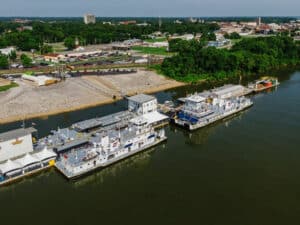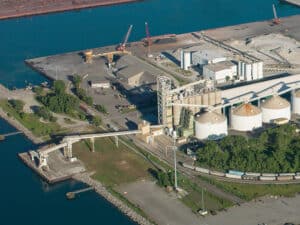
Lower Mississippi River deepening project officially kicks off
Written by Marine Log Staff
Louisiana Gov. John Bel Edwards tweeted this photograph of ceremonial signing of agreement to deepen the Mississippi River from the Gulf of Mexico through Baton Rouge
Lousiana Gov. John Bel Edwards and Louisiana Department of Transportation and Development Secretary Shawn D. Wilson joined officials with the U.S. Army Corps of Engineers on July 31 to announce an agreement for the deepening of the Mississippi River from the Gulf of Mexico through Baton Rouge has been authorized and signed.
“This is a great day for the people of Louisiana who depend on the Mississippi River for their livelihood,” said Gov. Edwards. “When completed, this project will allow larger vessels that can currently use the widened Panama Canal to reach Louisiana ports as far north as Baton Rouge. It will also allow for some vessels to carry heavier loads. Nationwide, industries that depend on this Mississippi River to move goods will benefit greatly from this dredging project.”
“The Mississippi River has always been a critical economic engine for the United States and connects our Nation’s heartland to the global economy,” said Major General Diana Holland, U.S. Army Corps of Engineers – Mississippi Valley Division Commander. “More capacity means greater efficiency in transportation and less costs for our Nation’s producers. From a benefit cost perspective, that equates to a benefit $7.20 for every dollar spent on operation and maintenance, a significant return on investment.”
The project will deepen the lower portion of the Mississippi River from 45 feet to 50 feet, and in turn, provide deep draft access to the ports at Plaquemines, New Orleans, South Louisiana and Baton Rouge.
“No single agency can undertake a project of this level, magnitude, and importance without great partners,” said Col. Stephen Murphy, U.S. Army Corps of Engineers – New Orleans District Commander. “The Corps is privileged to have such a partner in the Louisiana Department of Transportation. Together we look forward on delivering a project that will have immense benefits, not only for Louisiana, but across the nation.”
“With the signing today, we have taken one step forward toward providing a better future for countless Louisianans,” said DOTD Secretary Shawn Wilson, Ph.D. “If we work together with our natural resources and put a multimodal commerce plan in place, the Mississippi River can be an economic super highway and Louisiana can be a leader in global goods movement.”
“This is an important step forward for the shipping industry and commerce in our country,” said DOTD Commissioner of Multimodal Commerce Renee Lapeyrolerie. “State, local and federal officials along with other interested parties worked for a common goal that will culminate in benefits across the nation.”
Funding for the approximately $250 million project has been allocated through a variety of sources. As the non-federal sponsor, DOTD has committed $81 million.
Once completed, the deepening project will provide and expand global markets for Louisiana farmers, manufacturers and neighbors who rely on goods for jobs and their quality of life. The river and its tributaries account for over $750 billion of the nation’s economy and more than 2.4 million jobs. In Louisiana, one in every five jobs is port-related with the ports comprising almost 23 percent of the dollar amount for the state’s goods and services.
“The lower Mississippi River is the number one export region for America’s soybean and corn farmers,” said Mike Steenhoek, Executive Director of the Soy Transportation Coalition. “Enhancing the Mississippi River simultaneously enhances the competitiveness and profitability of American agriculture. Encouraging this collaborative approach is not only beneficial to farmers and others reliant upon the river, but it also shares the non-federal cost of this project beyond the people of Louisiana. I am proud that the State of Louisiana is partnering with the farmer leaders of the United Soybean Board, the Soy Transportation Coalition, and others in promoting this project of national significance.”
One foot of additional depth will allow approximately $1 million in additional cargo, enabling vendors to use the Mississippi River, once completed, and its inland tributaries versus the more expensive land bridges.

![Tom Frazier aground and listing to starboard on Feb. 11, 2024. [Photo: U.S. Coast Guard]](https://www.marinelog.com/wp-content/uploads/2025/06/Towboataground-300x225.jpg)


